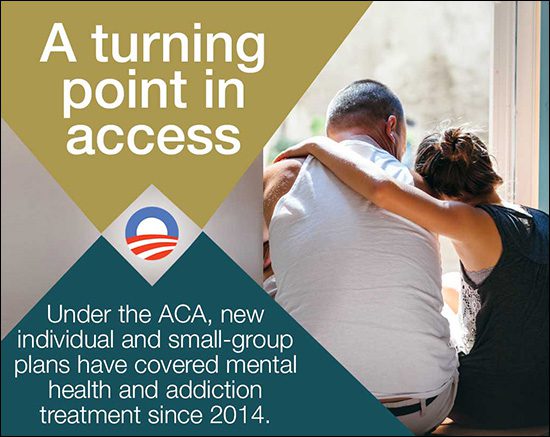Change is never easy, but it’s even more complex when there’s a seismic shift in the federal government’s ideology and policy. Under the new administration, Republicans are pushing the American Healthcare Act in an effort to repeal and replace the Affordable Care Act passed during the Obama Administration.

If the Republican-sponsored bill passes in its current form, Medicaid will no longer cover basic mental health and addiction services at a time when opioid overdoses and deaths have seen a nationwide spike.
“Taken as a whole,” Joshua Sharfstein tells The Washington Post, “it is a major retreat from the effort to save lives in the opiate epidemic.” Sharfstein is an associate dean at Johns Hopkins Bloomberg School of Health.
Under the ACA, also known as Obamacare, an estimated 1.3 million people get treatment for substance abuse and mental health disorders. In fact, the two diseases often go hand in hand, one exacerbating the other. This is known as a dual diagnosis or co-occurring disorder. Recovery from issues of post-traumatic stress disorder and addiction is most effective when both conditions are addressed and treated simultaneously.
Removing the mental health and substance use coverage, which the American Healthcare Act removes, will impact approximately 11 million low-income families in 31 states, including Ohio, West Virginia and Kentucky, where the opioid epidemic continues to ravage whole communities.
How Pervasive is Opiate Addiction in the United States?
The Centers for Disease Control and Prevention compiles data on just how pervasive addiction to opiates, including heroin, is in the United States. The CDC reports the following statistics:
- 183,000 opioid-related overdose deaths occurred from 1999 to 2015
- In 2015, more than 15,000 people died as a result of taking prescription opioid painkillers
- The most common prescribed opioids that lead to overdoses and deaths are Hydrocodone, Oxycodone and Methadone
- Nearly 2 million Americans abused prescription painkillers or were opioid-dependent in 2014
- Every single day, more than 1,000 Americans are treated in emergency rooms for misusing opioids
Criticism of the new healthcare bill is not limited to one side of the aisle. Prominent republicans, such as Ohio Governor and former presidential candidate John Kasich, have come out against the removal of mental health and addiction coverage.
“Phasing out Medicaid without a viable alternative is counterproductive and unnecessarily puts at risk our ability to treat the drug-addicted, mentally ill and working poor who now have access to a stable source of care, “Kasich told the Associated Press.
Emily Kaltenbach of the Drug Policy Alliance warns that passage of the American Healthcare Act could deepen the addiction crisis. Changes to Medicaid, Kaltenbach tells Vice News, might mean recovering opioid addicts will lose access to Suboxone, an effective drug used in medically assisted addiction treatment. In other words, the opioid crisis would probably get worse under Trumpcare.
Healthcare has become a politically charged topic in the last several decades and there seems to be no perfect solution that all parties can agree on. One thing is certain; Americans are paying close attention to how the federal government plans to address those suffering from mental health and addiction diseases.
Image courtesy of HealthInsurance.org
Related:
The 21st Century Cures Act is a Bipartisan Miracle
U.S. Addiction Statistics According to the Surgeon General





